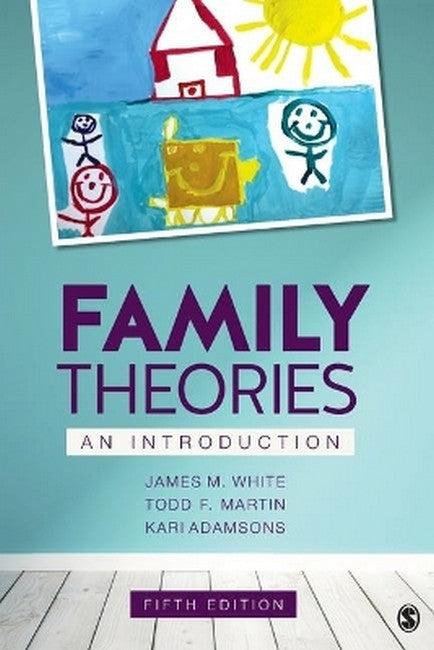James M. White is a Professor in the School of Social Work and Family Studies at the University of British Columbia and resides with his wife and three daughters in Vancouver, Canada. His research interests include family development as well as marital interaction and communication. He is the author of Dynamics of Family Development (published in the U.S. in 1991 and translated into Japanese in 1994), as well as numerous articles that have appeared in the Journal of Family Issues, Journal of Social & Personal Relationships, Journal of Marriage and Family, and elsewhere. His authored and co-authored book chapters include a chapter with R. H. Rodgers on family development in the Sourcebook of Family Theories & Methods (1993). He has served as referee for numerous journals in family relations and public health and is an Associate Editor for the Canadian Journal of Public Health, Journal of Comparative Family Studies, and The International Encyclopedia of Family Relationships. He is a past-president of the Northwest Council on Family Relations, whose membership includes academics, practitioners, and therapists from the states and provinces of the Pacific Northwest. He is also an Honorary Fellow of the National Council on Family Relations. Todd F. Martin is Associate Professor in the Department of Sociology and Dean of the Faculty of Humanities and Social Sciences at Trinity Western University. He is co-author of Families Across the Life Course (2012). He holds degrees in Theology, Family Studies, and Sociology. His work has been published in journals such as the Journal of Adolescent Research, International Migration Review and Journal of Family Theory and Review. He has also contributed to edited volumes on the topic of fertility as well as work and family interaction. His current research is on cohabitation, adolescent religious socialization, and union dissolution. Currently he is the Managing Editor of The Journal of Comparative Family Studies He is a member of the National Council on Family Relations and active in the Theory Construction and Research Methodology Workshop. Kari Adamsons is an Associate Professor of Human Development and Family Studies at the University of Connecticut. She holds a master's and Ph.D. in Human Development and Family Studies, and a B.A. in Psychology. Her work has been published in journals such as the Journal of Family Psychology, Parenting: Science and Practice, and the Journal of Family Theory and Review. Her research focuses on fathering, coparenting, and identity theory. She is an associate editor for the Journal of Social and Personal Relationships and a member of the editorial board for the Journal of Family Theory and Review. She is the current Chair of the Research and Theory section of the National Council on Family Relations, and she is a past Chair of the Theory Construction and Research Methodology Workshop.
Request Academic Copy
Please copy the ISBN for submitting review copy form
Description
Foreword Preface Acknowledgments Chapter 1 What Is a Theory? Architecture of a Scientific Theory Defining Theory Functions of Theory Theories About Families Evaluation of Theory Frameworks Study Questions Chapter 2 Classical Social Theories and Family Theories Philosophies of Science Values in Science What Is an Explanation? Classical Social Theories A Brief History of Family Theory Conclusion Study Questions Chapter 3 The Rational Choice and Social Exchange Framework Intellectual Traditions Focus and Scope Assumptions Concepts Propositions Variations Empirical Applications Critiques and Discussion Conclusion Study Questions Chapter 4 The Symbolic Interaction Framework Intellectual Traditions Focus and Scope Assumptions Concepts Propositions Variations Empirical Applications Critiques and Discussion Conclusion Study Questions Chapter 5 The Family Life Course Development Framework Intellectual Traditions Focus and Scope Assumptions Concepts Propositions Variations Empirical Applications Critiques and Discussion Conclusion Study Questions Chapter 6 The Systems Framework Intellectual Traditions Focus and Scope Assumptions Concepts Propositions Variations Empirical Applications Critiques and Discussion Conclusion Study Questions Chapter 7 The Conflict and Critical Theories Framework Intellectual Traditions Focus and Scope Assumptions Concepts Propositions Variations Empirical Applications Critiques and Discussion Conclusion Study Questions Chapter 8 The Feminist Framework Intellectual Traditions Focus and Scope Assumptions Concepts Propositions Variations Empirical Applications Critiques and Discussion Conclusion Study Questions Chapter 9 The Ecological Framework Intellectual Traditions Focus and Scope Assumptions Concepts Propositions Variations Empirical Applications Critiques and Discussion Conclusion Study Questions Chapter 10 Theory Construction and Emerging Theories Stages of Theory Construction Methods of Theory Construction Strategies of Theory Construction Emerging Theories Conclusion Study Questions Chapter 11 Epilogue Metatheory and Theory Development The Future of Family Theory Conclusion References Index About the Authors
"This text offers a deeper level of theoretical analysis than other textbook options. It is particularly helpful for those preparing for graduate education." -- Bethany Willis Hepp, PhD "This book does a great job of speaking of each theory--functionalism, social exchange, symbolic interaction, life course, etc.--in an easy to understand, digestible way for students." -- Richard N Pitt "It uses scientific language that is necessary to introduce students to the frameworks of theories in general, as well as those that are specifically used within the field of marital and familial studies." -- Lauren Dick, M.S "It is probably the most comprehensive text specifically on Family Theories that I have seen." -- Duane Alan Dowd, Ph.D. "We chose the text because it covered the frameworks that we had already deemed appropriate. We also liked the assumption/concept/prop format." -- Michelle Sherwood, Prof

